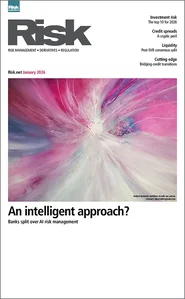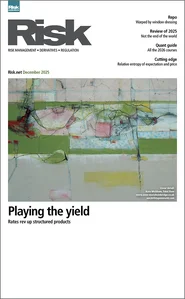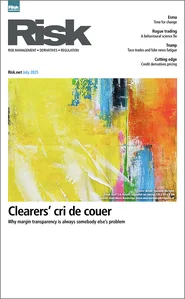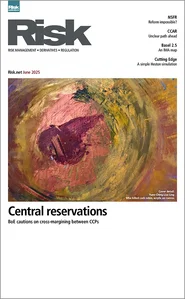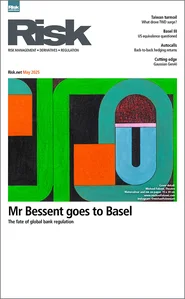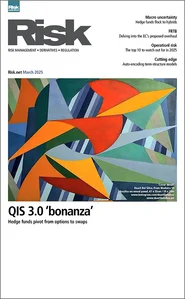Risk magazine - Volume22/No3
Articles in this issue
Plugging the gaps
The various post mortems into the causes of the financial crisis have highlighted weaknesses in bank risk management practices. In particular, many banks approached risk on a silo basis, with little attention given to firm-wide exposures. Are banks…
The short story
The UK Financial Services Authority ended its ban on short selling of financial stocks on January 16. How have financial stocks performed since the restrictions were lifted? Christopher Whittall investigates
Time to take stock
Plenty of pressure will be put on financial institutions to strengthen risk management processes in the wake of the financial crisis. However, firms might be better served focusing on getting the basics right, rather than necessarily doing more, argues…
A counter-cyclical Basel II
The Basel Committee on Banking Supervision is making various changes to the Basel II framework in the wake of the financial crisis. But Ryozo Himino argues there should be greater focus on incorporating a built-in stabiliser into the Accord
Where rocky horror assets go
With injections of government capital seemingly having little effect on restoring confidence in ailing banks, thoughts have once again turned to quarantining distressed assets. Rob Davies examines the options available to policy-makers
Challenging times for VAR
With the release of three new consultation papers in January, the Basel Committee has come up with its most ambitious plans yet for tackling the challenges presented by the financial crisis. But its proposal to overhaul VAR models is coming in for some…
Contract counterattack
Efforts to recover the value of nearly 200,000 derivatives transactions conducted with Lehman Brothers have been frustrated by a provision of the International Swaps and Derivatives Association master agreement. But the bankrupt estate is fighting back…
Systemic risk capital
We have seen what can happen when the size of financial institutions rivals - or even surpasses - that of their home countries. It may be time to limit the size of institutions through imposition of systemic risk capital requirements, argues David Rowe
From Scratch
Vincent van Pelt, global head of equity derivatives andcommodities, Standard Chartered, talks to Rachel Morison
Long overdue
New due diligence and risk weighting guidance for resecuritisations aims to prevent a repeat of the credit crisis, but should these measures have been included in the 2006 version of Basel II? By Peter Madigan
Capital Smorgasbord
Questions are being asked about the level of capital held by banks, after the financial crisis forced governments across the world to make emergency capital injections. Will this change what qualifies as tier-one and tier-two capital? By Duncan Wood
CDS risks
Claims that credit derivatives were a major cause of the financial crisis have prompted regulators to threaten to clamp down on the market. In the latest in the current series of Class Notes, Charles Smithson examines some of the risks of credit default…
Clear benefits
The role of central counterparties is being given increased prominence in the over-the-counter markets, with regulators calling for clearing houses for credit derivatives. But how do central counterparties manage their risks? By Clive Davidson
Joining the SABR and Libor models together
Fabio Mercurio and Massimo Morini propose a Libor market model consistent with SABR dynamics and develop approximations that allow for the use of the SABR formula with modified inputs. They verify that the approximations are acceptably precise, imply…
Error of VAR by overlapping intervals
When overlapping intervals in time series are used, volatility and price changes' percentiles are underestimated. Consequently, value-at-risk is also underestimated. Heng Sun, Izzy Nelken, Guowen Han and Jiping Guo measure the size of this underestimation
Trusted to make the right decision
Dr Laurence Wormald, head of research at SunGard's APT, discusses new research that illustrates how the right risk analytics can help firms manage their portfolios during this volatile time
Learning from Basel's mistakes
Regulators are looking again at the Basel II Accord in an attempt to incorporate the lessons learned from the financial crisis. What have Solvency II rule-makers learned from the Basel experience? Joel Clark investigates
Bonding exchanges
Profile
Rainy day funds
Exchange-traded funds (ETFs) have continued to gain traction in South Africa despite agitated markets. As a result, local ETF providers are extending their reach to new investors and asset classes - with some even looking to introduce exchange-traded…
A return to structured products?
Structured products have been largely shunned since the collapse of Lehman Brothers last September, but low returns in other asset classes may prompt institutional investors to return to the sector in the year ahead. By Peter Madigan
Difficulties with deficits
Pension deficits have rocketed, with slumping equity markets decimating asset portfolios. Has this made bulk purchase annuity solutions more attractive or are the costs too punitive? Ryan Davidson reports
Adapt or fail
Since October last year, extreme movements in South Africa's foreign exchange rate have caused offshore hedge funds to exit the market, while dealers have been reluctant to take on risk. Those that remain active have had to adapt their behaviour. By Mark…


























